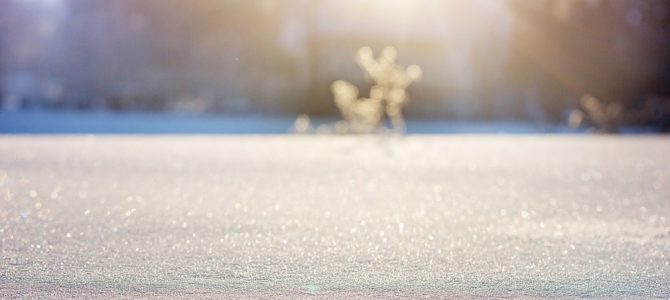Yesterday I wrote about darkness. Today, snow. Both permit us to forget.
Snow covers clutter. A snowscape’s beauty is a desert beauty, sparse and inhospitable. But in temperate climes, at least, this barrenness isn’t oppressive. Instead, it’s a welcome change from the ferment and decay of other seasons. The snow falls, and permits us to forget what’s underneath it, at least for a little while. Fresh snow, of course, remembers the imprint of everything that crosses it, at least for a little while. But then the wind blows, or more snow falls, or it melts, and those traces, too, are forgotten.
Plenty tells us forgetfulness is undesirable. Memory is necessary for thought—for life. We chastise children for their forgetfulness and warn one another that those who forget history are doomed to repeat it. A youngster could easily get the impression that it would be best in life if he Never. Forgot. Anything.
But then a day comes when you realize you’re glad of what you’ve forgotten.
Snow Reminds Us How Much We’ve Forgotten
For me, the first few winters of marriage were like this. The blank snow, the great silence of winter, reminded me how much of unmarried life I’d already forgotten—and was glad to forget. Not glad to forget every memory—some skill-based memories unfortunately disappeared along with the rest. But skills can usually be re-learned. Other memories are just as well unlearned. It means finally being free of them. Or free-ish, if vague contours remain, unrecognizable though not hidden beneath the snowfall.
I grew up believing snowy Christmases weren’t just normal, but proper. In my lapsed Lutheran family, a brown Christmas seemed liturgically incomplete. Christmases should be dark, starry, and snowy, so that huddling around a light-bedecked evergreen tree would seem perfectly natural. Later, when I got religion, I went through a phase of doubting whether elements so climate-dependent, and, well, pagan-seeming should feature so prominently in a universal Christian holiday. Now I know better than to bother with these doubts, and not just because it makes Christmas with largely irreligious relatives more enjoyable.
That the light that shines in the darkness, kindling itself after the fragrant blaze of fall has burnt to the black and white ashes of winter, that salvation should be born amid snowy forgetfulness, is not at all unfitting. Even if this way of looking at things is largely the result of living at a certain latitude during a particular climate cycle. It’s not wrong to become attached to expressing universal truths in particular forms.
Why We Love White Christmases
Despite the snow on the ground right now, weathermen are lowering the odds of a white Christmas this year. AccuWeather warns, “A mild weather pattern will grip the nation,” Christmas being perhaps the only day of the year mild weather could grip anything. There are websites devoted to calculating your neighborhood’s chance of enjoying a white Christmas. Our town’s odds are only one in four.
The part of me that knows how important hurrying and bustling from one relative’s house to another—making drives promptly and safely, getting packages delivered on time, getting ourselves over each others’ doorsteps without the added drama of slips on ice and snow—is to the duties of the season is glad, I suppose, when a brown Christmas means one less thing to worry about. But still, when the snow’s not there, I miss it.
I miss the bridal white that reminds me to be glad of what I’ve forgotten, even while it reminds me of Christmases long ago, Christmases of my childhood and my ancestors, when it was natural to imagine the Nativity not really as it must have been in Bethlehem, but happening in a snow-covered stable amid the firs, with the breath of the animals crystallizing into ice, and the snow ready like a blank page to record the steps of the curious shepherds, the steps of every creature ready to forget his old self because of the new life in the snow, the new light in the darkness.









